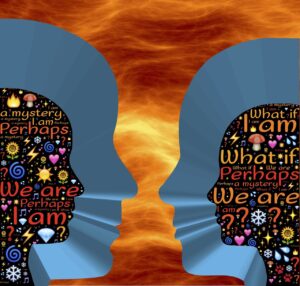
How to build and maintain healthy relationships is a fundamental aspect of personal development and well-being. Whether it is with family, friends, romantic partners or colleagues, effective communication and strong connections form the foundation of fulfilling relationships. Relationships are the vibrant threads that weave our experiences together. The ability to cultivate and sustain these connections defines not only our happiness but also our personal growth. It is through relationships that we learn the art of love, compassion, empathy, and resilience, ultimately shaping the individuals we become.
Let’s explore the significance of healthy relationships, the art of effective communication and the essential skills required to nurture these bonds.
The Importance of Healthy Relationships:
At the core of human existence lies the need for connection. Healthy relationships provide the emotional scaffolding that supports us during life’s challenges and magnifies our joys. They offer solace during times of distress, a shoulder to lean on when we stumble, and a source of endless laughter in moments of celebration. These connections are not mere luxuries but vital components of a fulfilling life. Research consistently highlights their positive impact on mental and physical well-being, emphasising that strong relationships can lead to longer, happier lives.
Healthy relationships are crucial because they can provide emotional support, reduce stress and increase happiness. Interactions with others can lead to personal growth through shared experiences and perspectives. Strong professional relationships can boost career opportunities and job satisfaction.
Effective Communication: The Foundation of Connection
Communication is the bridge that spans the gap between individuals. But it is not just about talking; it’s about truly connecting. Effective communication involves active listening, empathy and the ability to express oneself honestly and authentically. It goes beyond mere words and transforms interactions into meaningful exchanges. It’s not about the quantity of words spoken but the quality of connection forged through them.
Let’s dig deeper!
Active Listening – The Art of Truly Hearing:
Active listening, a key component of effective communication, is an art worth mastering. It is more than just hearing words; it is about immersing oneself in the speaker’s world, absorbing not only the message but also the emotions, differences, and unspoken sentiments. When we actively listen, we extend an invitation to the speaker to open their heart, knowing they’ll be heard and understood.
Picture a scenario where a friend shares their joys, fears, or struggles. Active listening involves putting aside your own thoughts, judgements, and distractions, and devoting your full attention to them. It’s about maintaining eye contact, nodding in acknowledgment, and offering verbal cues like ‘I understand’ or ‘Tell me more’. By doing so, we create a safe space for them to express themselves fully, fostering a sense of trust and intimacy.
Empathy – The Power of Walking in Another’s Shoes:
Empathy is the bridge that allows us to cross over into the emotional landscape of others. It is the ability to step into their shoes and view the world from their perspective. Empathy goes beyond sympathy; it is not just feeling sorry for someone but feeling with them. It is a profound acknowledgment of their emotions, whether they are experiencing joy, sadness, anger or fear.
When we approach conversations with empathy, we send a powerful message that we care, that we are willing to connect on a deeper level. It means not rushing to offer solutions or advise but simply being present and validating their feelings. By saying ‘I can imagine how that must have felt’ or ‘I understand why you feel that way’ we affirm their emotions and provide a sense of relief that someone truly comprehends their inner world.
Open and Honest Expression – Vulnerability in Connection:
Effective communication is a two-way street. It is not just about listening; it is also about sharing authentically. Vulnerability becomes the cornerstone of genuine connection when we have the courage to express our thoughts, emotions, and concerns openly and honestly. It is about removing the masks we often wear in society and being our true selves.
When we communicate with authenticity, we invite cooperation. By sharing our fears, hopes, and dreams, we encourage others to do the same. This vulnerability fosters a sense of intimacy that goes beyond surface-level interactions. It is the recognition that we’re all imperfect, that we all have fears and insecurities, and that it is okay to be ourselves.
In the tapestry of effective communication, threads of active listening, empathy, and authentic expression intertwin to create connections that are not just superficial but profound. These connections, built on trust, understanding, and vulnerability, form the bedrock of healthy relationships. They allow us to traverse the human experience with companions who truly see us, hear us, and accept us for who we are, enriching our lives in. ways that words alone could never capture.
Building Connections – A Skill Worth Cultivating
Relationships are not static; they are living entities that require care, attention, and the nurturing touch of intentionality. Building and maintaining connections isn’t a passive process; it’s a dynamic skill, an art form that, when mastered, can enrich our lives in profound ways. It is the conscious effort to cultivate the bonds that matter most, to forge new connections, and to sustain existing ones, even as life’s tides ebb and flow.
Strategies for Forging New Connections:
Creating new connections can be an exciting yet daunting endeavour, whether in social or professional spheres. It often begins with stepping outside our comfort zones and embracing the unfamiliar. Strategies for forging new connections involve active participation in activities, groups, or communities that align with our interests and values. It is about seeking out opportunities to meet like-minded individuals and engaging in meaningful conversations.
Furthermore, it is essential to approach new connections with an open heart and an open mind. Listening attentively, showing genuine interest, and finding common ground are key components of building rapport. Embracing the art of small talk can lead to deeper conversations and potential friendships or partnerships. The process requires patience and persistence, as not every encounter will result in a lasting connection. Nonetheless, each interaction offers an opportunity for growth and learning.
The Delicate Dance of Intimacy in Romantic Relationships:
Romantic relationships, often considered one of the most intimate forms of connection, require a delicate dance of vulnerability and trust. They thrive when both partners are willing to share their deepest selves, fears, dreams, and aspirations. Intimacy is cultivated through open and honest communication, a willingness to be emotionally present, and a commitment to nurturing the unique bond that two individuals share.
Understanding the love languages of both partners can enhance connection. It’s about recognising how each person expresses and receives love – whether through acts of service, quality time, words of affirmation, physical touch, or gifts – and actively incorporating these expressions into the relationship.
Moreover, sustaining romantic relationships involves adaptability and a willingness to weather storms together. Life’s challenges will inevitably arise, but it’s how partners face these challenges together that ultimately strengthens the bond.
The Importance of Maintaining Friendships:
Friendships are the timeless treasures of our lives, often enduring the tests of time and distance. They require consistent effort to maintain, especially as life’s tides ebb and flow, leading us down different paths. Staying connected with friends involves regular communication, making time for shared experiences, and showing appreciation for the unique qualities each friend brings to our lives.
In moments of transition, such as relocating to a new city or experiencing major life changes, friendships may require additional attention. It is during these times that proactive measures, such as scheduling regular catch-ups, sending heartfelt messages, or planning visits, can help keep the bonds strong.
Professional Relationships – Networking and Collaboration:
In the professional world, relationships play a pivotal role in unlocking opportunities and driving success. Networking, often viewed as a crucial aspect of career development, involves the art of building and maintaining professional connections. It is about more than collecting business cards; it’s about cultivating genuine relationships based on mutual respect and shared goals.
Collaboration within professional relationships can lead to innovative solutions, enhanced productivity, and career advancement. It requires effective communication, trust, and a willingness to combine skills and expertise for a common purpose. Building a professional network is an ongoing process, and it is essential to nurture these connections even when there is no immediate benefit, as they can bear fruit in unexpected ways.
In essence, building connections is a multifaceted skill that encompasses both the art of initiating new relationships and the commitment to sustaining and nurturing existing ones.
It is an investment in the richness of our human experience, fostering growth, personal development, and a sense of belonging that transcends the boundaries of time and circumstance. By approaching this skill with intention and effort, we unlock the potential for deeper, more meaningful connections that enrich our lives immeasurably.
Applying Skills Learned – Turning Knowledge into Action
The insights and knowledge you will gain from this blog are not mere intellectual exercises; they are powerful tools waiting to be wielded in the real world. They are the keys to unlock the doors of connection, understanding, and fulfillment in your relationships. To fully harness their potential, here are some practical tips, actionable exercises, and real-world scenarios to help you seamlessly integrate these valuable lessons into your daily interactions.
Heartfelt Conversations with Loved Ones:
One of the most rewarding applications of the skills you’ll acquire is the ability to engage in heartfelt conversations with your loved ones. These conversations go beyond surface-level chatter; they delve into the depths of emotions, aspirations, and shared experiences. By actively listening, empathising, and authentically expressing yourself, you will navigate these conversations with grace.
You will discover the art of asking open-ended questions that encourage your loved ones to share their thoughts and feelings openly. You will learn to provide a safe space for them to express themselves, free from judgement or interruption. Through your newfound skills, you will foster an environment where honesty and vulnerability flourish, strengthening the bonds that connect you.
Networking Events – Building Meaningful Professional Connections:
In the professional arena, networking events often serve as platforms for growth and opportunity. Armed with effective communication skills, you’ll navigate these gatherings with confidence. You will approach each interaction as an opportunity to establish genuine connections, rather than just collecting business cards.
By actively listening to the needs and aspirations of others, you will discover ways to collaborate and offer assistance. You’ll understand the importance of follow-up, nurturing these connections beyond the initial meeting, and turning them into valuable professional relationships. Networking will no longer be a daunting task but a chance to foster meaningful connections that can impact your career positively.
Conflict Resolution at Work:
Conflict is an inevitable part of professional life, but it doesn’t have to be a source of stress or discord. Armed with your newfound skills in communication and empathy, you will approach workplace conflicts as opportunities for growth and collaboration. You’ll have the tools to facilitate open and constructive dialogue that lead to resolution rather than escalation.
You’ll learn techniques for active listening during disagreements, allowing each party to feel heard and understood. Your ability to express yourself honestly and authentically will encourage others to do the same, creating an atmosphere of transparency and trust. Conflict will no longer be something to avoid, but a chance to strengthen relationships and foster a more harmonious work environment.
Embracing the Journey – Lifelong Growth in Relationships:
As you embark on this exploration of human connection, it is essential to remember that building and maintaining relationships is a lifelong journey, not a destination. Each interaction, whether big or small, serves as an opportunity to practice and refine your skills. Every conversation, every disagreement, and every moment of connection is a chance to learn and grow.
By embracing this journey, you will approach each relationship with a sense of curiosity and humility. You will view challenges as steppingstones to deeper understanding and resilience. And you will find that the beauty of genuine connection lies not only in their existence but in the continuous process of nurturing and evolving them.

Relationships stand as the most vibrant and cherished threads of our lives. We looked at the profound journey of human connection and discovered that these relationships are not just chapters of our story; they are the very essence of it. The art and heart of relationships hold boundless significance in our lives.
From the importance of nurturing healthy relationships to the transformative power of effective communication, we unearthed the tools and insights necessary to forge connections that resonate deeply. Relationships require more than mere existence; they demand intention, effort, and the commitment to continual growth.
Effective communication, as the bedrock of connection, has shown us that it is not enough to merely speak words; we must also listen, empathise, and express ourselves authentically. Through active listening, we become attuned to the emotions and differences beneath the surface of words. Empathy grants us the ability to walk in another’s shoes, fostering profound understanding. And through open and honest expression, vulnerability becomes the bridge to genuine connection.
You are now armed with the knowledge and tools to foster relationships that enrich your life in ways you could never have imagined. These skills are not meant to be passive lessons but active tools to be used in the real world. As you apply these skills in your daily interactions, you will discover that the true magic of connection lies in its ability to transform us and those around us, making our shared human journey even more extraordinary.
Remember that the journey itself is as significant as the destination. Building and maintain relationships is a lifelong pursuit, a continuous evolution that enriches our existence. Every interaction, every moment of connection, is a chance to learn, to grow, and to leave an indelible mark on our shared human experience. In the art and heart of relationships, we find not just the colours that brighten our lives but the very essence of what it means to be human.



